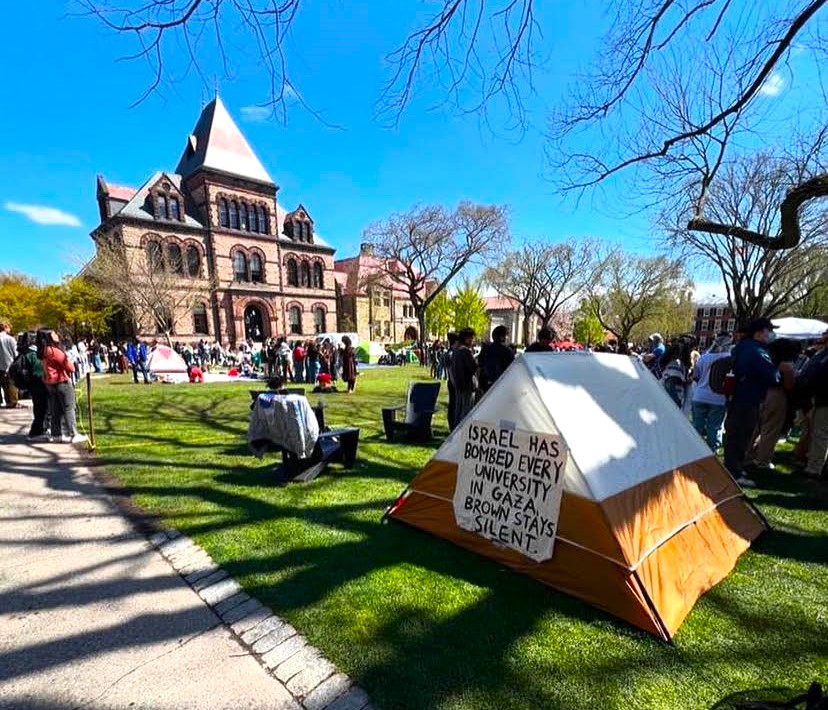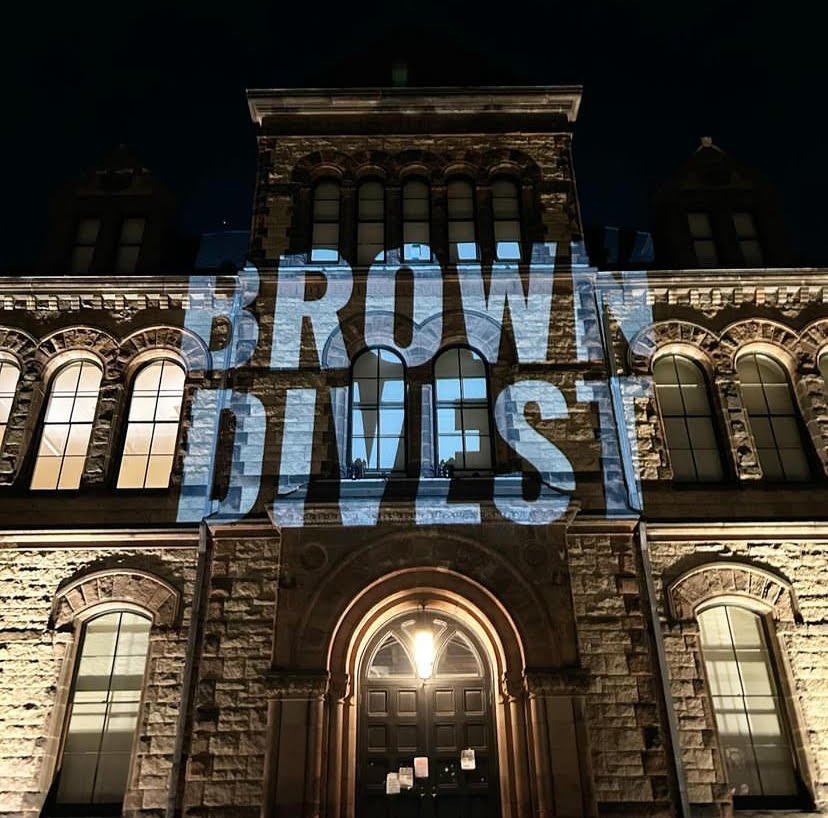
On April 24, 2024, a group of students at Brown University launched a Gaza solidarity encampment, a movement that spread across college campuses across the country and across the globe demanding university divestment from companies that fund the ongoing war in Gaza.
One early spring evening, I visited the encampment on the Main Green of the Providence-based college campus and was met with a tremendous display of tents, handpainted signs, and groups of students sitting in circles sharing dinner and listening to various community members voice their thoughts. I sat on the Green with Rafi Ash, a sophomore at Brown double concentrating in Urban Studies and Mathematics, who is also the spokesperson for the Brown Divest Coalition Gaza Solidarity Encampment.
“We are here demanding to hold universities accountable for their complicity in the genocide in Gaza. For many of these encampments, that begins with divestment and to end all financial assistance to the Israeli army as it perpetuates a genocide against the Palestinian people,” Ash explained. “This is a very important step towards conceptualizing the endowment as a violent force that has perpetrated serious harm, and a step towards demanding a ceasefire.” Ash, along with around 110 other students, had been occupying the green for about six days straight, sleeping in pitched tents under the chilly air. Over the course of the day, their numbers grew to around 500 with faculty, staff, and community members all showing up in support.
Ash explained that there was a wide range in how people have been viewing these college protests. “There’s no official strike, but I think there is a realization that there can be no business as usual during a genocide,” he said. The students of the Brown Gaza Solidarity Encampment reportedly received serious threats from administration during the encampment, and there certainly was a fear of escalation amongst the students. “We’ve seen what other universities have done. We’ve seen the direct police violence carried out at so many similar institutions across the country. And we’ve seen that Brown is not afraid to arrest its students,” Ash said. “I was one of 60 students arrested last semester.” (On December 11, 2023, 41 Brown University students from the Brown Divest Coalition were arrested after occupying University Hall demanding divestment from Israel military occupation and a ceasefire in Gaza. On Tuesday, May 14, the city court ruled that these charges will be dropped provided the students are not rearrested in the next six months.)
While this fear remains in the students’ minds, the community keeps them together. “We keep ourselves safe and build security through solidarity with each other, and the more of us that are here, the more of us that are taking these risks, the smaller these risks can be,” said Ash. “We’re here together, and that’s what holds us secure.”

Ash explained that the Brown Gaza Solidarity Encampment, the Brown Divest Coalition, and the Brown Students for Justice in Palestine represent a vast majority of the Brown University population. On April 25, the Brown University Community Council, which represents a broad sample of students, staff, faculty, and Providence community members, voted in favor of “advancing divestment from the Israeli occupation of Palestine before the Brown Corporation at its upcoming meeting in May.” Following this campaign victory, the students of the Brown Divest Coalition entered negotiations with the administration that the university had never entered before.
As of April 30, these negotiations resulted in a deal struck between the Brown Gaza Solidarity Encampment and the administration; a post on the Brown Divest Coalition’s Instagram account reads, “This morning President Christina Paxson agreed to allow a group of students and faculty to present the amended Critical Edition of the 2020 ACCRIP [Advisory Committee on Corporate Responsibility in Investment Policies] report to the Brown Corporation at their meeting in May, to be brought to a binding vote in October. This is a major victory for the Brown Divest movement and the nationwide movement for divestment from Israel, and affirms the power of this encampment and encampments nationwide. With this achievement, the BDC Gaza Solidarity Encampment is ending today.” The Brown Corporation reportedly does not meet to discuss investment policies between May and October.
“Brown University has a long history of protests,” said Ash. “And it’s a history that the administrators often brag about. We’re always being told that the last generation of protesters were heroes, and the current generation of protestors is violating university policy. In the mid-’90s, students sat in University Hall, demanding need-blind admissions; and students led a hunger strike that led to a successful divestment from South African apartheid. In the library, there are displays of these protests. Brown brags about a legacy of activism on their website.”
Through all the noise, the Brown Gaza Solidarity Encampment emphasizes the importance of holding Gaza and the Palestinian people at the focus of the cause. According to the Gaza Ministry of Health, since October 7, 2023, more than 34,904 Palestinians have been killed, including 7,797 children, and “not including more than 10,000 reported missing or under the rubble.”
“We are part of so many institutions in our lives beyond our educational institutions, like the United States government, that have shown complete unwillingness to value Palestinian lives in the past months. The solution is mobilizing and building a mass movement to demand a better world,” Ash pointed out.
“The underlying message is that we’re here despite all the risks, and we understand that those risks are so insignificant compared to the risks those in Gaza face simply for existing,” he said. “What does it mean to be afraid of these university functions, of these university administrators, when there are no universities left in Gaza? They’ve all been destroyed.”